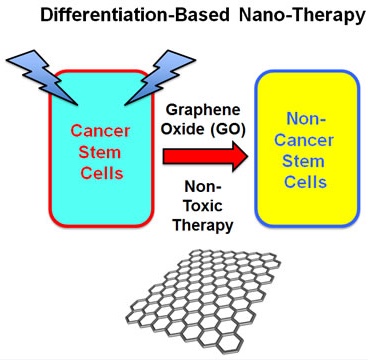Graphene shown to neutralize cancer stem cells
February 26, 2015

Graphene oxide targeting cancer stem cells with differentiation-based nano-therapy (credit: Marco Fiorillo et al./Oncotarget)
University of Manchester scientists have used graphene oxide to target and neutralize cancer stem cells (CSCs) while not harming other cells.
This new development opens up the possibility of preventing or treating a broad range of cancers, using a non-toxic material.
In combination with existing treatments, this finding could eventually lead to tumor shrinkage as well as preventing the spread of cancer and its recurrence after treatment, according to the team of researchers led by Professor Michael Lisanti and Aravind Vijayaraghavan, writing in an open-access paper in the journal Oncotarget.
“Cancer stem cells possess the ability to give rise to many different tumor cell types,” said Lisanti, the Director of the Manchester Centre for Cellular Metabolism within the University’s Institute of Cancer Sciences. CSCs are responsible for the spread of cancer within the body — known as metastasis — which is responsible for 90% of cancer deaths.
“They also play a crucial role in the recurrence of tumors after treatment. This is because conventional radiation and chemotherapies only kill the ‘bulk’ cancer cells, but do not generally affect the CSCs.”
Targeted delivery

Graphene oxide flakes in water solution selectively inhibited proliferation of six types of cancer stem cell types; shown here, lung cancer cells before (left) and after (right) treatment (credit: Marco Fiorillo et al./Oncotarget)
“Graphene oxide can readily enter or attach to the surface of cells, making it a candidate for targeted drug delivery,” said Vijayaraghavan. “In this work, surprisingly, it’s the graphene oxide itself that has been shown to be an effective anti-cancer drug.
“Cancer stem cells differentiate to form a small mass of cells known as a tumor-sphere. We saw that the graphene oxide flakes prevented CSCs from forming these, and instead forced them to differentiate into non-cancer stem-cells.
“Naturally, any new discovery such as this needs to undergo extensive study and trials before emerging as a therapeutic. We hope that these exciting results in laboratory cell cultures can translate into an equally effective real-life option for cancer therapy.”
May be effective for all types of cancer
The team prepared a variety of graphene oxide formulations for testing against six different cancer types — breast, pancreatic, lung, brain, ovarian and prostate. The flakes inhibited the formation of tumor-sphere formation in all six types, suggesting that graphene oxide could be effective across all, or at least a large number of, different cancers, by blocking processes that take place at the surface of the cells. The researchers suggest that, used in combination with conventional cancer treatments, this may deliver a better overall clinical outcome.
The researchers noted that the research results also show that graphene oxide is not toxic to healthy cells, which suggests that this treatment is likely to have fewer side-effects if used as an anti-cancer therapy.
Andre Geim and Konstantin Novoselov at the University of Manchester won the Nobel Prize in Physics in 2010 for “groundbreaking experiments regarding the two-dimensional material graphene.”
Abstract of Graphene oxide selectively targets cancer stem cells, across multiple tumor types: Implications for non-toxic cancer treatment, via “differentiation-based nano-therapy”
Tumor-initiating cells (TICs), a.k.a. cancer stem cells (CSCs), are difficult to eradicate with conventional approaches to cancer treatment, such as chemo-therapy and radiation. As a consequence, the survival of residual CSCs is thought to drive the onset of tumor recurrence, distant metastasis, and drug-resistance, which is a significant clinical problem for the effective treatment of cancer. Thus, novel approaches to cancer therapy are needed urgently, to address this clinical need. Towards this end, here we have investigated the therapeutic potential of graphene oxide to target cancer stem cells. Graphene and its derivatives are well-known, relatively inert and potentially non-toxic nano-materials that form stable dispersions in a variety of solvents. Here, we show that graphene oxide (of both big and small flake sizes) can be used to selectively inhibit the proliferative expansion of cancer stem cells, across multiple tumor types. For this purpose, we employed the tumor-sphere assay, which functionally measures the clonal expansion of single cancer stem cells under anchorage-independent conditions. More specifically, we show that graphene oxide effectively inhibits tumor-sphere formation in multiple cell lines, across 6 different cancer types, including breast, ovarian, prostate, lung and pancreatic cancers, as well as glioblastoma (brain). In striking contrast, graphene oxide is non-toxic for “bulk” cancer cells (non-stem) and normal fibroblasts. Mechanistically, we present evidence that GO exerts its striking effects on CSCs by inhibiting several key signal transduction pathways (WNT, Notch and STAT-signaling) and thereby inducing CSC differentiation. Thus, graphene oxide may be an effective non-toxic therapeutic strategy for the eradication of cancer stem cells, via differentiation-based nano-therapy.